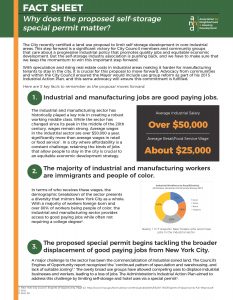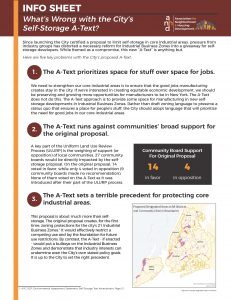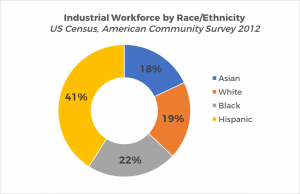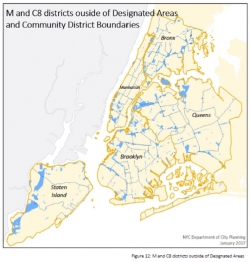City Steps Back from their Industrial Action Plan
Almost two years to the day since Mayor de Blasio announced his historic Industrial Action Plan, the City seems to be stepping back from their plan. Yesterday, the City Planning Commission voted on a proposal to mix manufacturing and self-storage in core industrial areas. Rather than vote on the City’s own original proposal to limit self-storage, which was supported by the majority of community boards and industrial service providers, the Department of City Planning (DCP) put forward an amended proposal that will continue the self-storage industry’s as-of-right access to our core industrial areas. As the final stop in Uniform Land Use Review Procedure (ULURP), the City Council has the power to make alterations and corrections to a proposal before the text is enacted.
Two years after the Action Plan, the Administration is losing sight of some of the Mayor’s goals. Land-use policies that protect good jobs are an important part of an equitable economic development vision for the City. Employment-dense, blue-collar manufacturing uses are increasingly being displaced by non-manufacturing uses, including and especially self-storage, across the city.
 The reforms that would have limited self-storage and hotels in the Industrial Business Zones were announced in the Action Plan two years ago. While the process for self-storage is reaching the end of its ULURP, the ULURP on hotels has not even started. All the while, these and other competing uses have continued to go up in core industrial areas, placing rent pressures on manufacturers to either pay up or get out. At this point, the City has the opportunity to fulfill one of these long-overdue promises to strengthen the IBZs.
The reforms that would have limited self-storage and hotels in the Industrial Business Zones were announced in the Action Plan two years ago. While the process for self-storage is reaching the end of its ULURP, the ULURP on hotels has not even started. All the while, these and other competing uses have continued to go up in core industrial areas, placing rent pressures on manufacturers to either pay up or get out. At this point, the City has the opportunity to fulfill one of these long-overdue promises to strengthen the IBZs.
But to do this, the City must ignore the self-storage industry and listen to the diverse set of manufacturers, developers, community boards, borough presidents, and city councilmembers, who are fighting in support of the Mayor’s original vision.
 The self-storage text amendment (in both the original and A-Text forms) is unique in that it would finally map the Industrial Business Zones in zoning maps, creating a foundation for future use group reforms. However, the A-Text that passed yesterday only creates a foundation for more carve-outs in our core industrial areas, essentially putting a bullseye on the Industrial Business Zones. Once the City opens the door to the self-storage lobby to shape policy, you open the door for arguments about manufacturers needing hotels or big box retailers nearby, the next important fight. This same tactic – watering down a protection through a mixed-use proposal – can be re-applied in any future attempt at use group reform. It is true that this proposal is setting a major precedent; it is crucial that the City and Council ensure it set the right precedent.
The self-storage text amendment (in both the original and A-Text forms) is unique in that it would finally map the Industrial Business Zones in zoning maps, creating a foundation for future use group reforms. However, the A-Text that passed yesterday only creates a foundation for more carve-outs in our core industrial areas, essentially putting a bullseye on the Industrial Business Zones. Once the City opens the door to the self-storage lobby to shape policy, you open the door for arguments about manufacturers needing hotels or big box retailers nearby, the next important fight. This same tactic – watering down a protection through a mixed-use proposal – can be re-applied in any future attempt at use group reform. It is true that this proposal is setting a major precedent; it is crucial that the City and Council ensure it set the right precedent.
Councilmembers know from their local Industrial Business Service providers and manufacturers that Industrial Business Zones need to be protected with meaningful zoning protections. As the core areas of industrial and manufacturing activity, Industrial Business Zones are hubs for good paying jobs and engines of economic opportunity. The Council has historically led and must continue to lead on strengthening Industrial Business Zones and championing industrial issues. ANHD and the Industrial Jobs Coalition look forward to continuing to work with the City Council to strengthen the IBZs, protect and grow industrial jobs and businesses, and keep the engine of opportunity running.
Armando Moritz-Chapelliquen, ANHD’s Campaign Coordinator for Equitable Economic Development
 ANHD 2016 Building the Community Development Movement
ANHD 2016 Building the Community Development Movement




